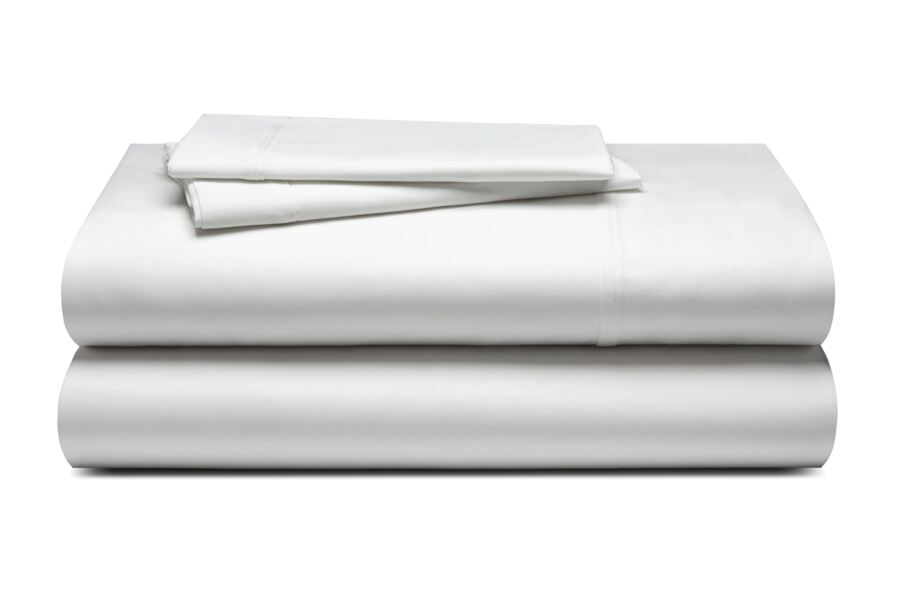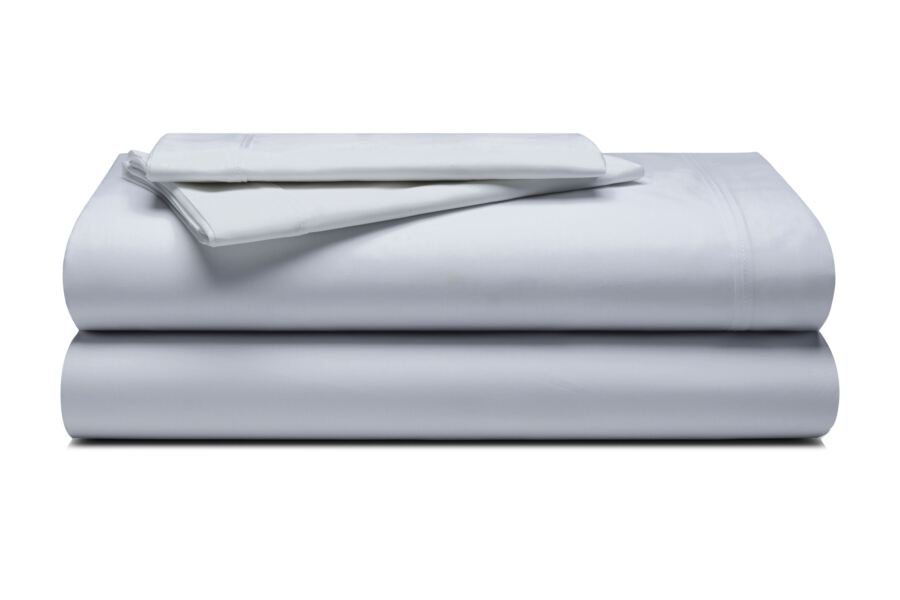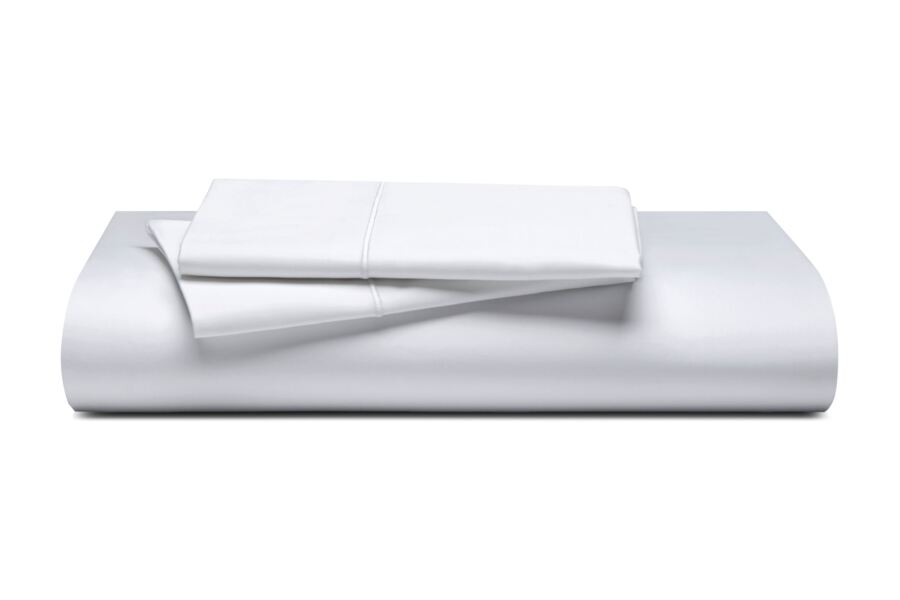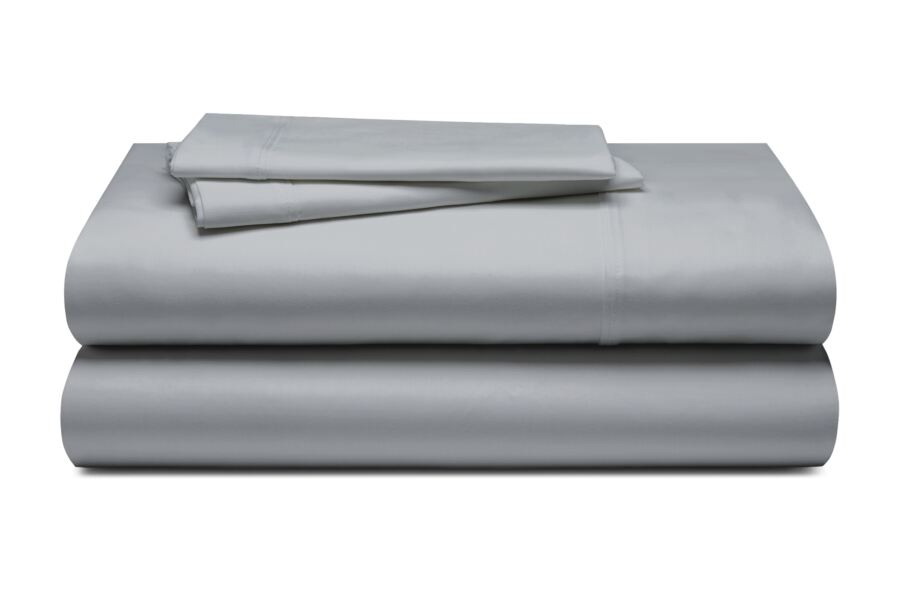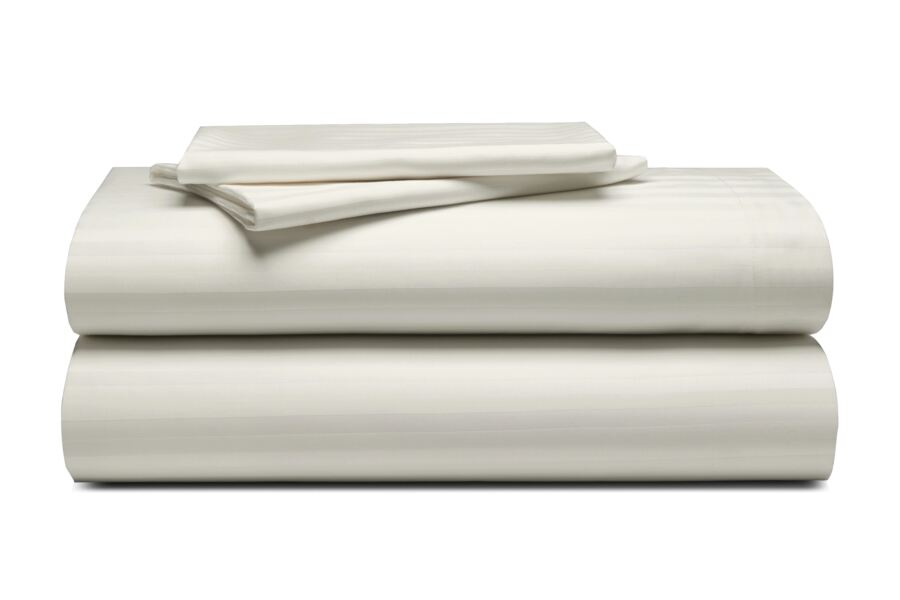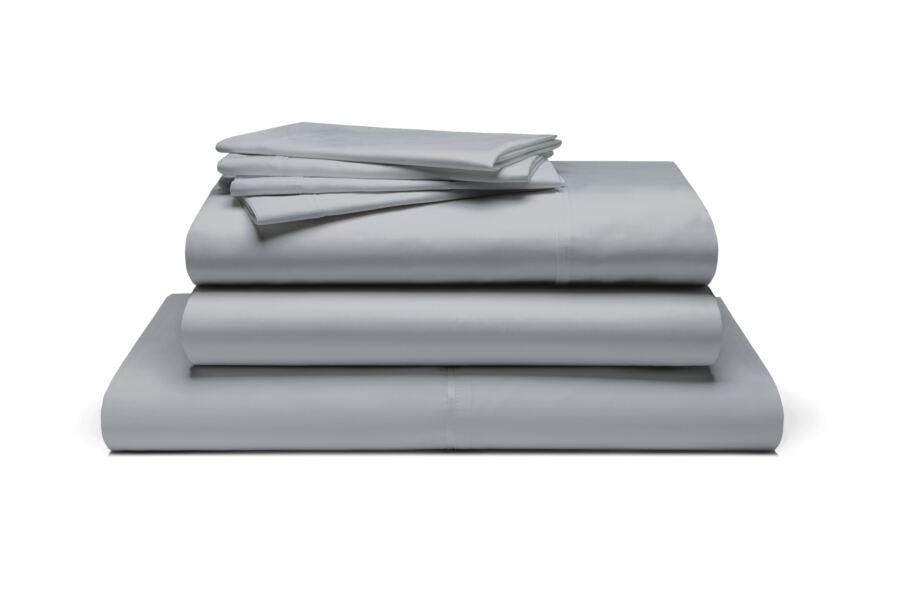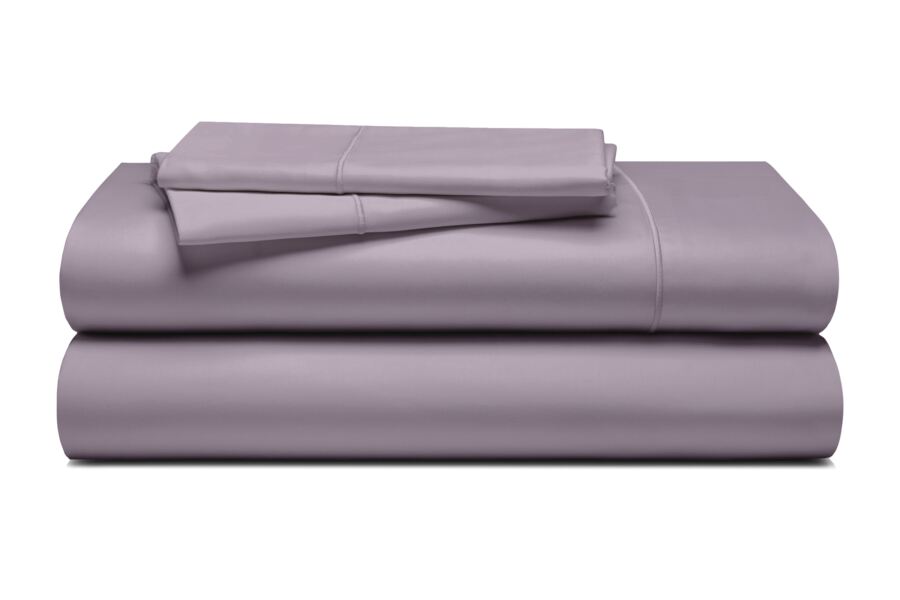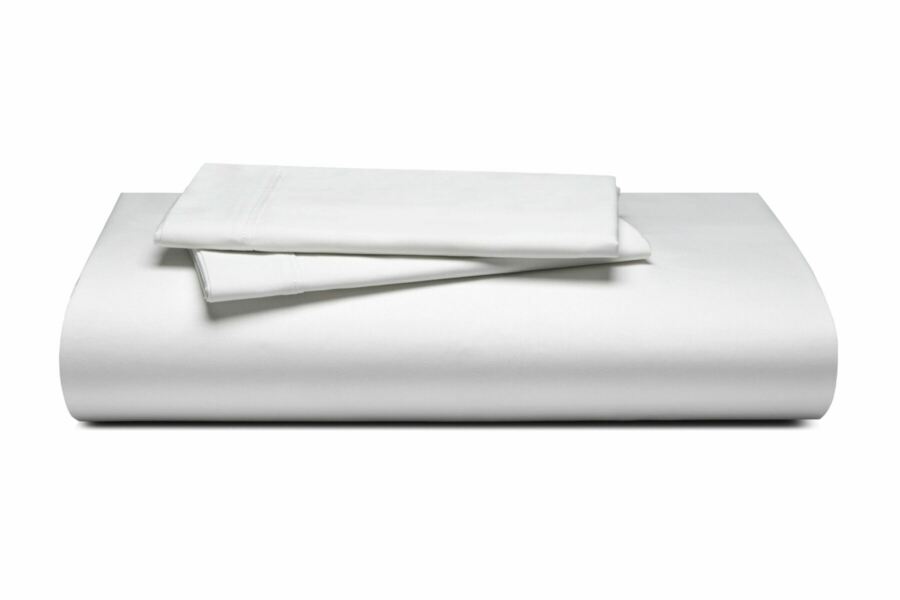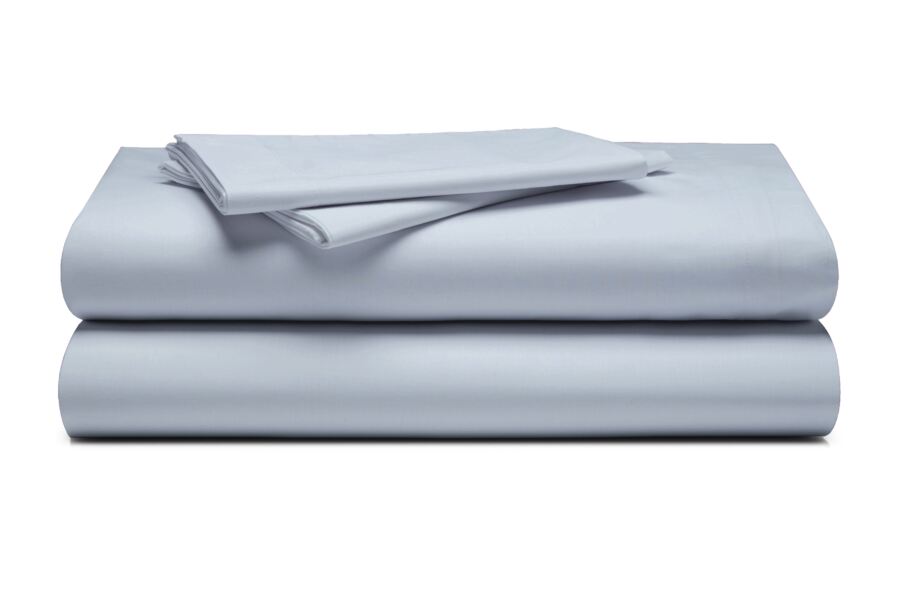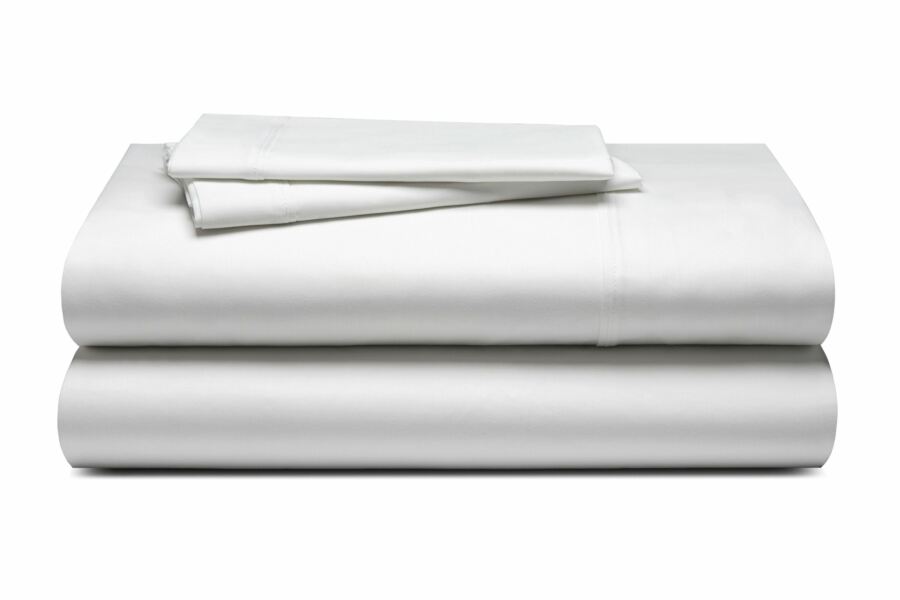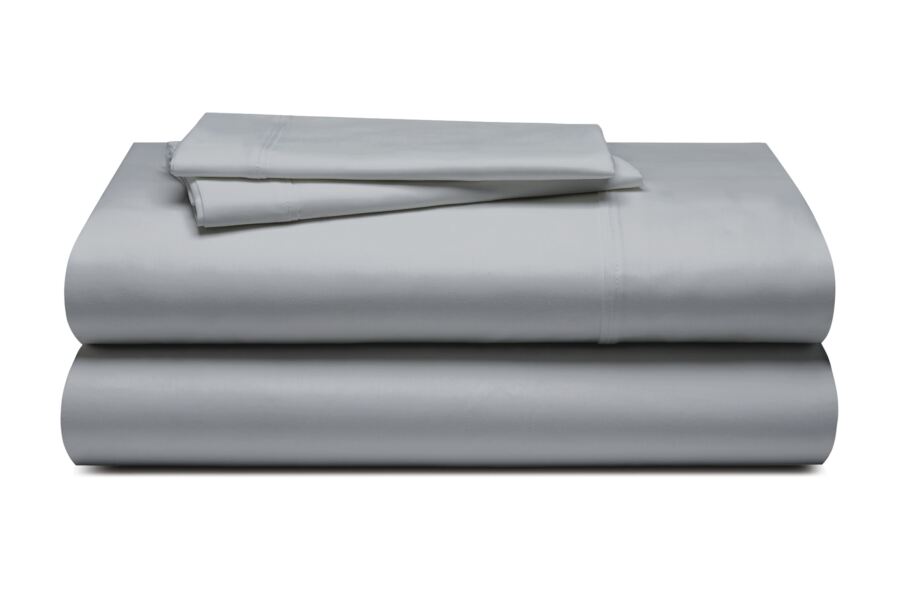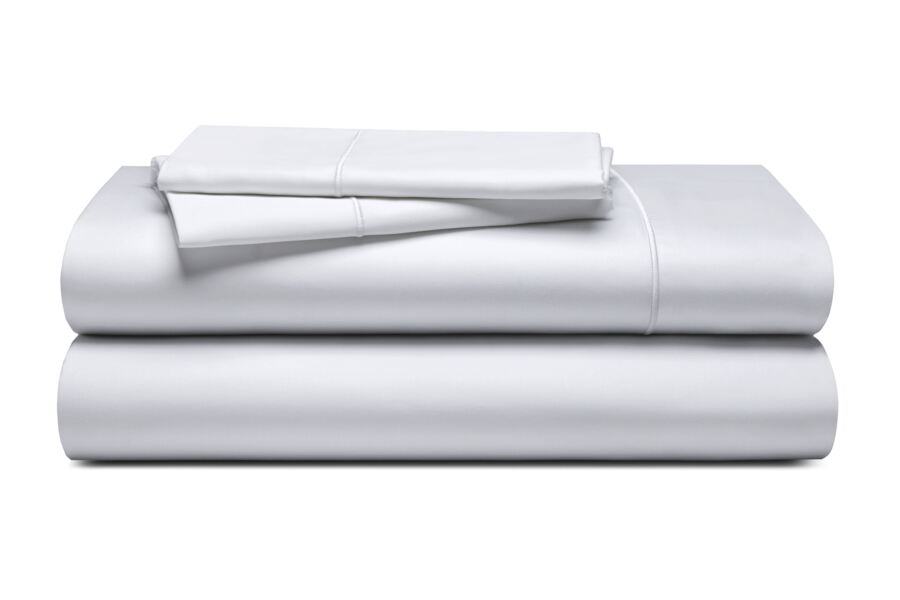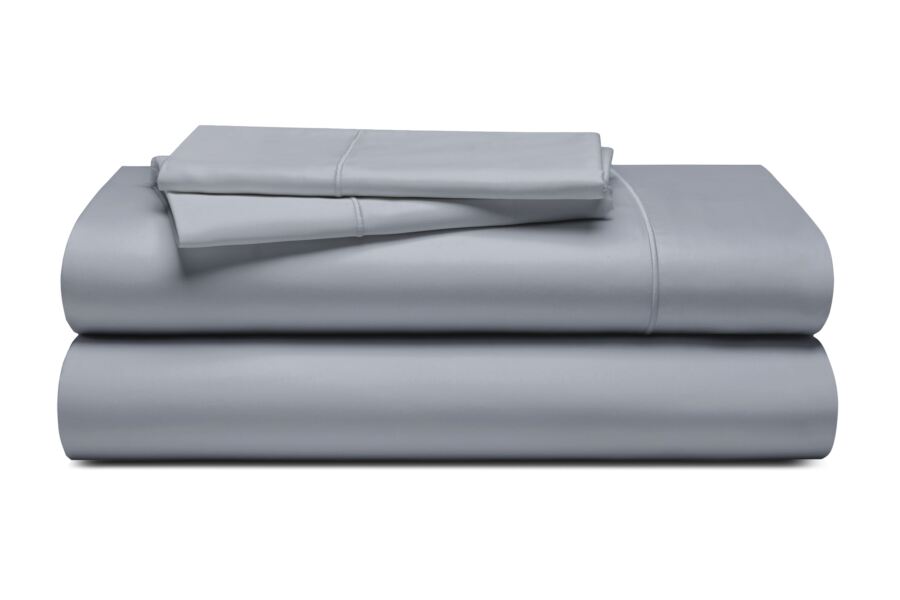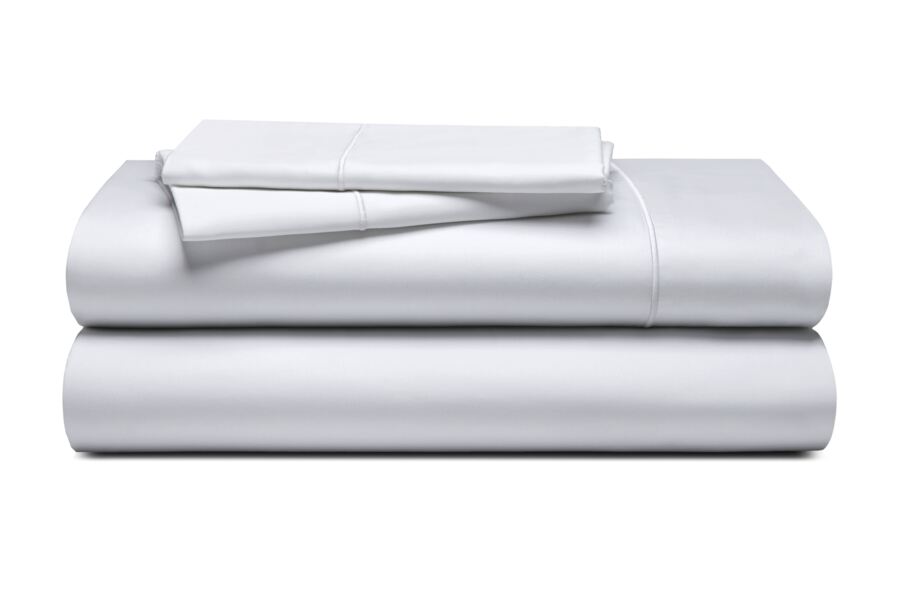Table of Contents
- The Best Fabrics For Bed Linen For Summer
- Factors To Consider When Choosing Bed Linen For Summer
- Bedding Accessories To Help You Beat The Summer Heat
- How To Care For Your Summer Bedding
- FAQs
- Final Thoughts
When the dreaded heat of summer arrives, finding the perfect summer bedding is crucial. If you don't, you may find yourself waking up in a puddle of sweat! And who wants that? Not us, that's for sure.
But what is the best bed linen for summer? The easy answer is lightweight, breathable fabrics that can absorb moisture and keep you cool. Still, there's more than meets the eye when it comes to picking these fabrics. There are several options to choose from, each with unique advantages you'll need to consider.
Luckily for you, we've done all the research on the benefits of different fabrics and what to look out for when you're buying new bedding. We've also included some tips on taking care of your bedding and a variety of accessories that will change up your sleeping game. So, all you need to do is grab your sleep mask, slip under the covers, and get ready to have the best sleep of your life.
The Best Fabrics For Bed Linen For Summer
The sticky heat of summer can sometimes make it feel as if a good night's sleep is nothing more than a pipe dream. Fortunately, choosing the right bed linen can make a huge difference in creating a cool environment when the temperatures start to rise.
When it comes to your bed linen, the fabric you choose plays a crucial role in the overall breathability and cooling effect. Although there's a variety of fabrics on the market, there are still some standout options that can help you to keep cool.
Understanding these fabrics and what makes them good for warmer weather is the first step to a peaceful night's sleep.

Cotton
Cotton is a natural fibre that is made from the cotton plant - no surprises there. As far as bed linen goes, cotton bedding is one of the most popular choices for its breathability and, in turn, its ability to keep you cool on hot summer nights.
Generally, cotton bedding lets more air circulate. Plus, cotton bed sheets have good moisture-wicking properties.
This means it can absorb moisture and draw it away from your skin to ensure you're dry and comfortable all night long. Of course, this is what makes it even better for people who suffer from night sweats or hot flashes when they sleep.
Additionally, cotton bedding has different price points; so you can find affordable options to suit your budget. Unlike some of the other fabrics on this list, you can snatch up premium cotton sheets without having to break the bank.
Advantages of cotton bedding
-
Great breathability and airflow
-
Moisture-wicking properties to keep you dry
-
Soft and comfortable
-
Widely available
-
Affordable
-
Fairly low-maintenance
Linen
You can't think of lightweight bedding without thinking about linen. Made from the natural fibres of the flax plant, linen is cool and airy, which makes it more breathable than most bed sheets. It's also great for cooling you down when the heat of the day is keeping you awake. That means no more sleepless nights.
Pure linen bedding has an open weave, which allows for hot air to escape from your body. This is fantastic for lowering your body temperature while you sleep and promoting ventilation. However, the texture of linen sheets or a linen duvet cover may be more coarse than other bed linen, so it may not be the best option if you have sensitive skin.
Luckily, linen bedding gets softer with every wash, which means it will get more comfortable over time. So, if you're willing to wait it out until your linen bedding begins to soften, then you'll have some of the best bedding to cool you down.
Linen bedding is extremely durable, so although it usually has a higher price tag than other bedding sets, it's a worthwhile investment that will last you for months to come.
Advantages of linen bedding
-
Lightweight
-
Breathable
-
Quick drying
-
Good for moisture absorption
-
Natural cooling properties
-
Durable and long-lasting
-
Gets softer and more comfortable with every wash
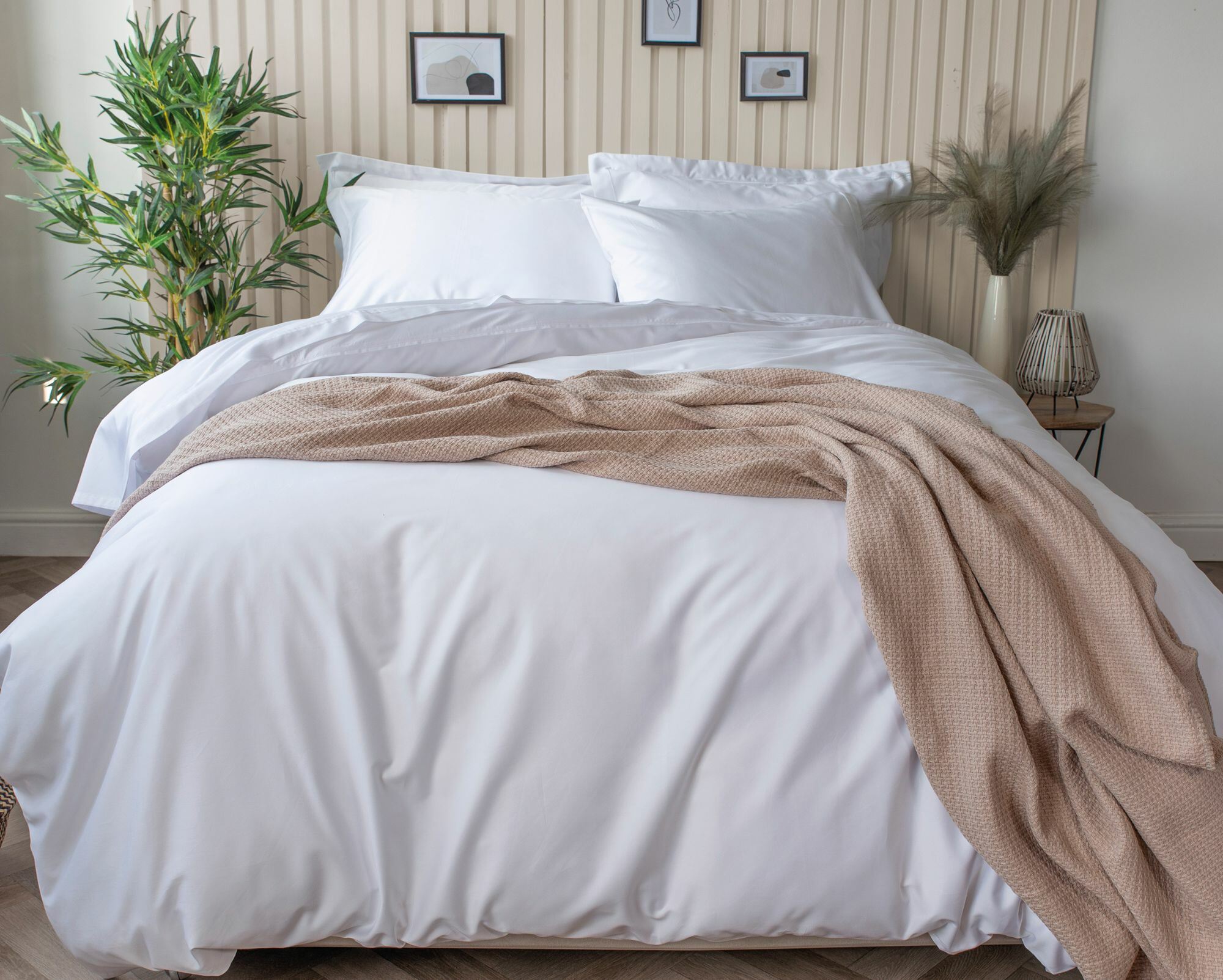
Bamboo
If you want sustainable and eco-friendly bedding that will keep you cool in the warm summer months and snug on colder evenings, then you'll want to pick up some bamboo duvet covers and sheets for your bed. Since bamboo grows so quickly - and without the need for intervention like pesticides and water - it's one of the most sustainable sources of bedding fabric.
This bed linen is made from bamboo plants, which are then spun into threads and woven into rich fabrics. These fabrics are extremely popular for their moisture absorption and airy feel.
Thanks to the minute holes and gaps in the weave of the fabric, this bed linen allows your body heat to escape and cool air to flow in and over your skin.
Although you get some bamboo bedding that is mixed with other textiles, pure bamboo sheets can be pretty pricey. But with a luxurious texture and durability (when it's well taken care of), you can also consider these sheets an investment - much like linen bedding.
Advantages of bamboo bedding
-
Fantastic for temperature regulation
-
Moisture-wicking properties
-
Soft and comfortable
-
Hypoallergenic
-
Good for sensitive skin
-
Eco-friendly
Silk
Produced by hard-working little silkworms, silk is a luxurious and natural protein fibre that makes some of the best sheets, bedding, and pillowcases around. With a soft and smooth texture, silk bedding feels like the height of comfort. Plus, it's lightweight and thin, which means it works well for keeping you cool and helping you to fall asleep in the warm summer months.
While silk dries quickly, it doesn't have the same moisture absorption as some of the other lighter fabrics on our list. So, if you tend to sweat, you may find yourself feeling a little damp when you wake up. But if you want to escape the heat and don't suffer from terrible night sweats, this could be the perfect fabric for your bedroom.
Silk can be quite expensive, but with other benefits, like its hypoallergenic properties, it's well worth the price. Summer can also make your skin dry and itchy, and there's nothing worse than sleeping on a coarse flat sheet - it will only make your skin feel more irritated! Luckily, silk is good for sensitive skin. Plus, it can help to fight bedhead by keeping your hair silky smooth (even when your room is stuffy and humid).
Advantages of silk bedding
-
Helps to regulate your temperature
-
Lightweight
-
Breathable
-
Luxurious texture
-
Suitable for sensitive skin
-
Hypoallergenic
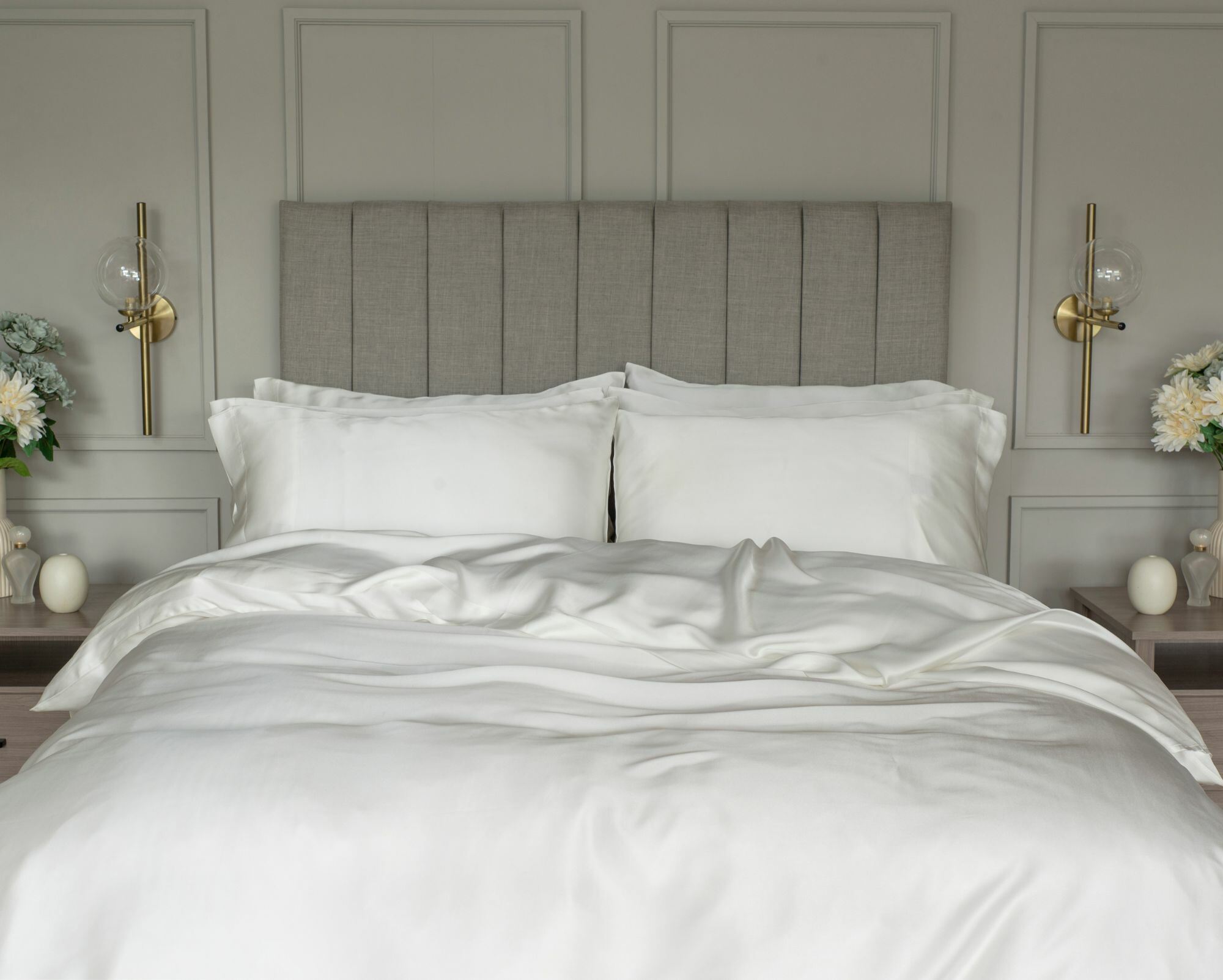
Lyocell
Lyocell, which is also known as Tencel, is another sustainable choice for your bed linen. Sourced from eucalyptus trees, this fabric is made from wood pulp in sustainable manufacturing and production processes.
The production process for Lyocell uses a closed-loop system that minimises waste, which is good for the environment and for you. On top of being eco-friendly, it has several other benefits for staying cool.
Firstly, Lyocell has fantastic moisture-wicking properties, which makes it ideal for even the hottest nights. And since it has a smooth and soft texture, it can be soothing against your skin. Additionally, Lyocell is hypoallergenic, which is good for staving off nasty allergies.
Advantages of Lyocell bedding
-
Excellent moisture management
-
Effective for cooling
-
Breathable
-
Environmentally-friendly production process
-
Good for your skin
-
Hypoallergenic
Factors To Consider When Choosing Bed Linen For Summer
With so many choices for bedding sets on the market, it can be tricky to find one that works for you. Now that we've narrowed down the best fabrics to keep you cool and comfortable, you're halfway to picking out your ideal sheets and duvet covers.
Some of the other factors you'll need to consider include things like breathability, thread count, and even the fit of your bedding (yes, even the fit makes a difference!). We've explained all of these factors below, so you won't have to spend ages finding the right bedding.
Breathability
Just like any other fabric, you'll want some good airflow to keep you cool. If a fabric is too thick, it won't be breathable. When this happens, your body temperature will rise and you'll feel even hotter than you did before! While this is great for winter, it's not the kind of fabric you want when the weather is warmer.
Temperature regulation
Since it can be hard to regulate your temperature when you're in bed, you'll want to invest in some bedding that helps to do it for you. Heavy blankets and thicker fabrics obviously mean more heat generation. And, in these cases, not even a light breeze from an open window or fan will help to cool you off.
Well, this is why it's important to have a lightweight and breathable sheet or blanket that is good for airflow. The more airflow there is, the more comfortable and cool you'll feel.
Moisture management
Breathable bedding sets also play a vital role in managing moisture when you're hot and sweaty. As you sleep, your body naturally perspires in an attempt to cool you down. These aren't exactly the best conditions for a restful night's sleep.
Fabrics with a bigger weave can soak up moisture, which helps to draw it away from your skin. As the sweat evaporates, you'll start to feel cooler. In turn, it will be easier to fall (and stay) asleep.
Comfort and sleep quality
Bed sheets that are too thick can make for an uncomfortable sleep environment. In fact, you may even end up overheating, which can lead to health complications if you have any underlying medical conditions.
Plus, when your airflow is restricted, you're likely to experience a lot more sweating than usual. We don't know about you, but when we're too hot, we spend the night tossing and turning - and there's nothing worse than disrupted sleep!
By picking out more breathable linens like cotton bedding, you'll be able to sleep more comfortably. So, say goodbye to terrible sleep and hello to long, restful nights!
Skin health
The heat of the summer months can sometimes cause skin irritation and rashes. Although there's not much you can do about your clothes, there's a lot you can do to stop this from happening with your bedding.
When your bed linen isn't breathable, it doesn't only trap sweat against your skin; it traps nasty bacteria too. This can cause skin issues if it's left for too long. A high-quality summer bed set can minimise the risk of skin conditions and can actually promote healthier-looking skin. This is particularly true for fabrics like silk since it even helps to reduce wrinkles! Talk about a win-win situation.
Hygiene
With lightweight bedding, you can help to reduce the chances of odour-causing bacteria from growing in the fibres of your bed sheets. In the same way that breathable bedding helps to draw bacteria and sweat away from your body, having a looser weave can also prevent the same bacteria from breeding and causing smelly, soiled linens.
With better airflow, you won't have to worry about musty odours, which also means you won't have to wash your bed sheets as often. Still, you'll need to be vigilant about maintaining your bedding if you want it to stay effective for longer.
Additionally, a cleaner sleeping environment makes for better sleep. After all, who wants to sleep under a smelly old blanket? Not us!
Thread count
We've all been there. You're sussing out new bed sheets and duvet covers, and wondering what difference their thread count will make. Well, it turns out that thread count can make quite a big difference - especially in summer months.
The thread count refers to the number of threads that are woven into one square inch of fabric. These threads are usually woven both horizontally (weft) and vertically (warp). Although there is no perfect thread count, certain fabrics feel and function better when they're between certain ranges.
Ideally, you'll want to choose bed sheets and a duvet cover with a thread count of at least 200. Some of the recommended ranges for summer fabrics include:
-
Cotton bedding: a thread count of 200 - 400
-
Egyptian cotton bedding: a thread count of 300 - 400
-
Bamboo bedding: a thread count of 300 - 500
-
Linen bedding: Linen bedding usually doesn't list its thread count. Instead, you'll have to rely on the feel of your linen sheets or linen duvet to give you an indication of its quality.
-
Silk bedding: Silk sheets also don't use thread count to measure their quality. Rather, silk is measured in momme, which is the weight of the fabric. Ideally, you'll want to pick silk sheets that are between 16 - 22 momme for a good balance of quality and comfort.
Weave
The weave of your bedding is an important factor to consider when you're looking for one that will work for the summer season.
The weave refers to how the individual threads are interlaced to form the fabric and directly affects its breathability. Different weaves allow for different levels of ventilation, so the looser the weave, the more ventilation you'll have. This is because there is more space between the threads for airflow.
Bed linens with looser weaves also allow hot air to escape more quickly. This can help you to regulate your body temperature and prevents overheating. When you switch to a more open weave, like a percale weave, you'll feel the difference almost instantly! What's more: a well-constructed weave can move moisture away from your body.
Over and above helping you beat the summer heat, the weave of your bedding impacts its durability. And when you're paying a hefty price for fabrics like Egyptian cotton or linen bedding, you're going to want your sheets to last.
It's important to remember that open weaves are more prone to snagging or tearing, so you'll also need to take extra care of your bedding. You'll want to find a good balance between breathability and durability to hit gold when you're picking out a new bedding set.
Sateen weave
Sateen is a slightly tighter weave that uses a four-over, one-under pattern. This pattern gives sateen a smooth and soft surface, making it comfy for a good night's sleep. You can usually find sateen weaves in cotton bedding, which is what gives it the perfect degree of softness.
Sateen is not always as breathable as other open weaves, however; so you'll want to consider this if you have a higher body temperature than most.
One of the best aspects of cotton bedding with sateen weaves is that it's less prone to wrinkling. So, rather than fussing over delicate fabrics like satin or bamboo, you can smooth out your duvet cover without much effort.
Percale weave
Percale weave is more popular for summer bed linens because it is light and airy. It has a more open weave than sateen, which makes it a great choice for avoiding hot flashes and sweating throughout the night. Percale typically has a crisp feel to it, which may be uncomfortable for some. Still, it's lightweight and gets softer the more that it's used and washed.
Percale weaves are strong and durable, so if you want something that will last for more than one summer season, you'll want to try it out. It can easily withstand regular washing and will retain its quality and effectiveness. This makes it a good choice for 'investment bedding' that may be slightly more expensive than others.
Texture
Choosing bed linens with a softer texture can be beneficial for dry skin. It's likely that your skin is already hot and irritated, so you won't want to make it worse by buying scratchy bed sheets or a textured duvet cover. Fabrics with a smoother and softer texture like silk or bamboo are much more comfortable, which can help you to stay asleep - even when it's hot and humid.
Textured fabrics can also create little pockets where hot air gets trapped, which means they're less breathable than smooth sheets. Still, some textures may help prevent the bedding from sticking to your skin. This is why coarser and lightweight fabrics, like linen, are fantastic for keeping you cool.
It's important to choose a texture that makes you feel comfortable, though. If you don't like the feel of satin sheets against your skin, it won't just be the heat that's keeping you awake. So be sure to test how different linens feel first to find one that suits your preferences.
Colour
It's a well-known fact that darker colours absorb more heat from sunlight than lighter, earthy colours - but the sun isn't the only heat that your sheets will absorb. They may even soak up the heat from overhead lights if they're on for long enough.
If you leave your curtains open to allow natural light into your bedroom, you'll likely find that your bed is much warmer in the evenings - especially if you have dark-coloured bedding. Unless you want to keep your room dark and dingy, you may want to choose lighter bedding in summer.
Lighter shades, like whites, pastels, or soft neutrals, can help to reflect heat and keep your bed cool. Plus, lighter linens often have a summery feel to them, which helps to brighten up your bedroom space. You may even be able to trick your brain into thinking that your room is cooler when your bedding looks airy and bright!
Hypoallergenic
Is there anything more infuriating than seasonal allergies? In the peak of summer, pollen, dust, and pet dander can make it very difficult to sleep. As if getting to sleep on the hottest nights isn't hard enough! Luckily, there's an easy solution to ease the discomfort of a stuffy nose and teary eyes: hypoallergenic bedding.
Hypoallergenic fabrics are specifically designed to create a barrier against common summer allergens, which means you'll have a more comfortable and peaceful night's sleep. They're also usually lightweight and breathable fabrics, which helps to keep you cool. It's a win-win situation if you ask us.
Hypoallergenic bedding is typically anti-microbial too. That means that any bacteria, mould, or mildew that would usually grow in the fibres of your bedding are worries of the past. Plus, these fabrics are fantastic options if you have sensitive skin.
Fit
When the summer heat hits, chances are you're already tossing and turning in your bed. You don't want to make it worse by getting tangled up in your bed sheets! Although a flat sheet can make for a nice, lightweight covering, you may want to switch out your bottom one for a fitted sheet to make sure it stays put - no matter how much you wriggle in your sleep.
You'll also find a cool sheet creates an effective barrier between you and your mattress. That way, you won't create any unnecessary heat that might disrupt your sleep.
To get the best fit, measure your mattress before heading to the shops, and buy bedding that matches these measurements. If sheets are too big they're going to wrinkle and make you uncomfortable. If they're too small, they're likely going to bunch up anyway and make buying new sheets pointless!
Luckily, most bedding is sold in standard sizing to suit your bed size (for example, double-sized sheets for a double-sized bed).
Bedding Accessories To Help You Beat The Summer Heat
Other than thin fabric bed sheets and breathable duvet covers, there are plenty of bedding accessories on the market that can help to keep you cool during the warm summer months. Thank goodness for cooling technology! When you add these accessories to your perfect lightweight bedding, you're guaranteed to have the best night's sleep.
Some of our favourite accessories include cooling pillows and mattress toppers or pads, but a lightweight blanket can be just as beneficial.
Here's everything you need to know:
Cooling pillows
Cooling pillows are designed to help you regulate your temperature and give you a cool and refreshing feeling. These pillows usually use cooling gel-infused memory foam, ventilated designs, and more breathable materials that promote air circulation around your head. They can help to draw away moisture and heat, keeping your head and neck cool and comfortable all night long.
Cooling mattress toppers
A cooling mattress pad or topper can transform your bed from a sweltering oven to a cool haven that will lull you into a peaceful sleep.
Like cooling pillows, these mattress toppers use gel foam or phase-changing material technologies that prevent heat retention and cool down your sleeping surface. When you pair them with cooling pillows, you're going to feel like you've cracked the cheat code to sleeping comfortably (even when the heat is keeping everyone else awake).
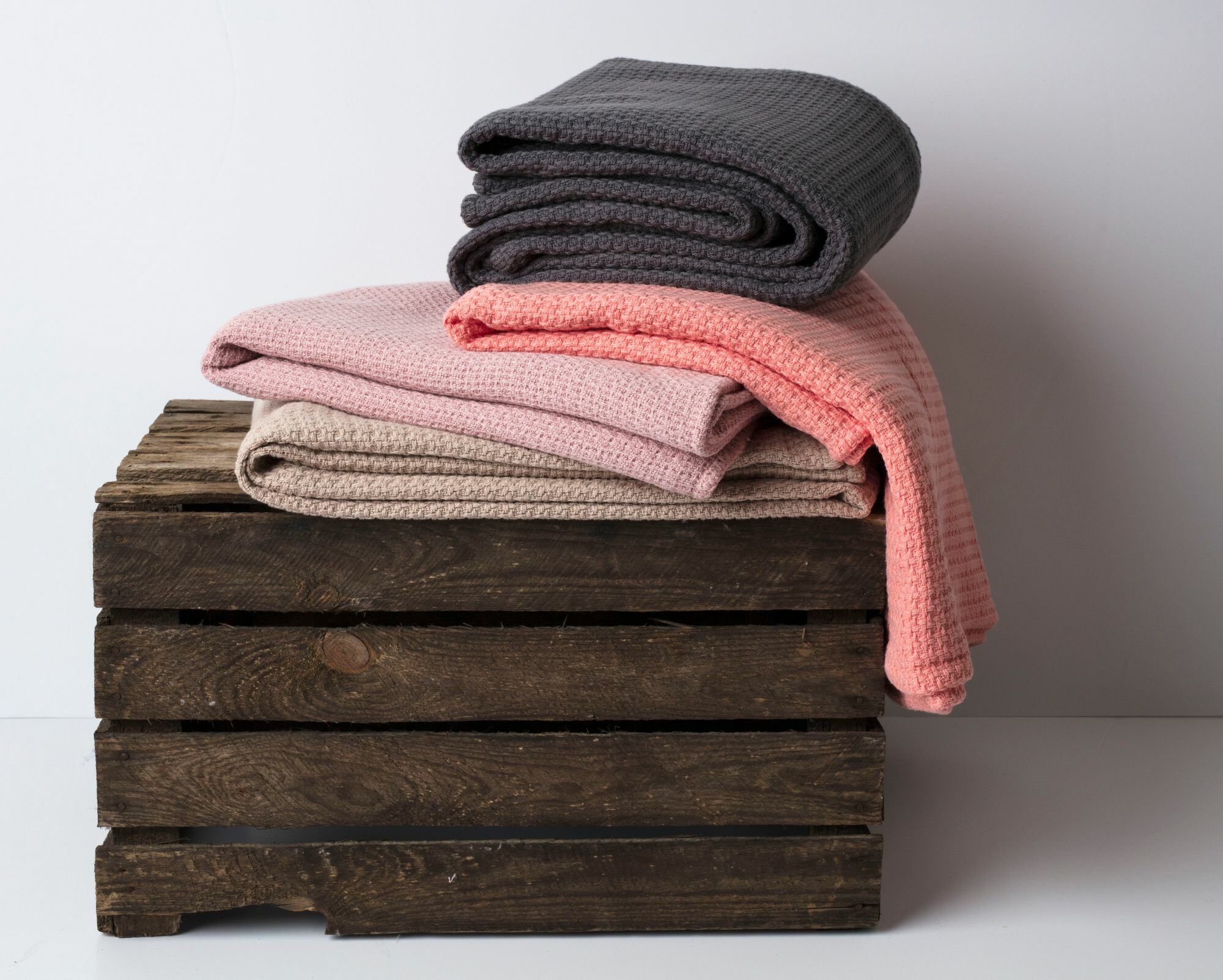
Lightweight blankets
If you're anything like us, you may feel a little exposed without some sort of duvet or blanket to sleep under. While a flat sheet can work as a lightweight covering, there's something about a blanket that makes your bed feel more inviting and comfortable.
You'll probably want to ditch your comforter or duvet in the summer months if you use a blanket. Replace the heavier bedding with a lightweight blanket or throw. These will help to keep you comfortable without overheating, so you can enjoy a more relaxed sleep.
How To Care For Your Summer Bedding
Since most high-quality summer bedding is made from delicate (and expensive) fabrics, you're going to want to care for them properly and make them last even longer. Plus, the more time you spend maintaining your sheets, the more effective they're going to be at keeping you cool at night.
Some of our top tips for caring for your summer bedding include:
-
Follow the care instructions: Cotton bedding, satin, bamboo, and linen bedding all have different care instructions to keep them in good condition. No matter which one you choose, you'll want to pay special attention to their labels and take note of the specific care instructions. If you don't, your bedding might wear more quickly, which means you'll be replacing it more often.
-
Wash your sheets regularly: Although you should wash your sheets more often in summer, you'll want to wash natural fabrics even more frequently. Sweat and body oils can ruin your sheets pretty quickly, and because you're likely to sweat more in summer, you're going to want to wash this residue out of your sheets as often as you can. Ideally, you should wash your bedding every two weeks.
-
Use cold water: When you're washing your sheets, it's better to use cold or lukewarm water. Hot water can sometimes ruin delicate fibres or shrink the fabric altogether! Cold water will help to wash away any dirt while also preserving the colour and quality of your bedding, so be sure to change the settings on your washing machine before you refresh your bedding.
-
Use a gentle detergent: Try to use a mild, fragrance-free detergent to wash your new summer bedding. Harsh chemicals may ruin the fabric or cause it to become hard and scratchy, which defeats the purpose of buying soft, luxurious fabrics.
-
Air dry: In the summer, there's likely plenty of sunshine to help you air dry your sheets. Tumble drying may shrink your linens or damage delicate fabrics, so it's always best to hang them in the sun or in a warm room with plenty of airflow. It can also help to air out any odours that may have stuck to the fabric's fibres.
-
Rotate your bedding: If you can, you should consider having multiple bedding sets for summer to rotate through the season. This will help to give time for your bedding to air out and reduce the wear and tear on your linens.
FAQs
Are microfibre or synthetic linens good for summer bedding?
Microfibre and synthetic bed linens can be good for your summer bedding because they are usually lightweight. This means that they can help to keep you cool, but only if you pick high-quality synthetic bedding sets. Cheaper bed sheets and duvet covers may not have the effect you're after.
We'd recommend choosing natural fabrics like cotton sheets and linen bedding if you want to make sure you're getting bang for your buck. These fabrics are more likely to be breathable and keep you cool. They will also last for a few summer seasons thanks to their durability.
How often should I change my bed linen during summer?
We all know the familiar feeling of dread we get on laundry day - especially when you have to wash your bed sheets! Unfortunately, the buildup of sweat and body oils in summer means you should be washing your bedding more often. Still, you'll only need to wash them every two weeks or so if you pick high-quality bedding.
If you suffer from seasonal allergies, you may need to wash your bedding more often to get rid of any dust or dander on your linens. Luckily, the more you wash and change your bedding, the cleaner and fresher your bed will feel. No matter the weather, a clean sleeping environment can do wonders for helping you to fall asleep at night.
Can I use a flat sheet with a fitted sheet during summer?
Some people prefer the feeling of using a flat sheet, and will sometimes use it instead of a blanket to help them keep cool. You can always get rid of your flat sheet altogether, though, and sleep with a lightweight blanket and fitted sheet instead.
Whether you use a flat sheet with a fitted sheet or not depends on your preferences. Usually, having a flat sheet on the top and a fitted sheet on the bottom can help to make your bedding more versatile. You can always take the flat sheet off if you're getting too warm.
What are the benefits of investing in high-quality bedding for summer?
Investing in high-quality summer bedding has many advantages. Not only are more expensive fabrics (like linen and satin) lightweight and breathable, but they're also fantastic for keeping you comfortable. It's already bad enough to feel hot and stuffy when you're trying to get some shut-eye, so why take the chance on trying to sleep on top of scratchy or uncomfortable bed sheets?
High-quality linens are also more durable than synthetic fabrics. So, although you may have to pay a higher price for your bed linens, it could end up being cheaper in the long run. It's much cheaper to pay for bed sheets once than to replace them every summer!
Final Thoughts
Wave goodbye to sweltering nights and interrupted sleep! With our list of the best summer bedding, you'll be prepared to beat the heat the next time summer rolls around. As long as you pick lightweight linens like cotton bedding or linen sheets, you won't have to 'sweat' it anymore.
You should also be sure to pay close attention to some of the other factors we've mentioned (like breathability and weave) to customise your bedding to your preferences. If you do, you can be sure that you'll be sleeping soundly in no time. No more nasty hot flashes or night sweats - just a good, peaceful sleep all night long.
References
https://www.sleepscore.com/blog/best-summer-bed-sheet-material/
https://www.peacockalley.com/blogs/the-linenry/pick-the-best-sheets-for-summer
https://www.aeyla.co.uk/blogs/the-blog/what-is-the-best-fabric-for-bedding
https://www.vogue.com/article/summer-bedding-how-to
https://www.sleepfoundation.org/bedding-information/best-thread-count-for-sheets

